Projects
Planning and Training
Review of global best practices, field visits and stakeholder consultation are done to develop disaster management plans. Capacity building exercises for effective implementation are done.
Technical Studies
Provide technical input into design of framework for analysis and review of DRM institutional assessment.
Innovations
To encourage young minds, incubator centres are established to mentor and train entrepreneurs to bring in innovation into the field of disaster management and climate change.
Knowledge Products
In order to support stakeholders in aligning their thinking towards risk proofing quick self-risk estimation tools are designed.
Projects 2024-2025
- Infrastructure for Disaster and Climate Resilience under AVCERR
- School Safety Program in three cities of Maharashtra
- Project evaluation for strengthening resilience: sustainable adaptation to climate change in flood-affected areas of Assam
- Comprehensive Analysis of Disaster Preparedness in Public Health Facilities Aiming to Strengthen Health Services
Project status: Ongoing, Client: GIZ
RIKA India is supporting German Development Corporation (GiZ) to map and document infrastructure-related works relevant to disaster risk management and climate change adaptation, both from rural India and globally. The study aligns with the guidelines for inclusion of infrastructure related interventions to be include in permissible list of activities under MGNREGS. While the scope involves infrastructure applicable across India’s various agro-climatic zones, particular emphasis will be placed on six specific agro-climatic/agro-ecological zones within the states of Bihar and Rajasthan. The aim is to ensure detailed and relevant insights that cater to the unique challenges and opportunities within these regions.
Project status: Ongoing, Client: UNDP
The School Safety Programme in the cities of Chhatrapati Sambhaji Nagar, Nagpur and Nashik is conceptualised under the ongoing umbrella Government of Maharashtra-UNDP Partnership Program on “Strengthening Disaster Risk Management Systems for the State Government”. The School Safety Programme aims to support the selected municipal schools from the three cities in enhancing their awareness, skills and capabilities for sustainable uptake of comprehensive school safety. The programme strives to do so by training the respective teaching and non-teaching staff from these schools as trainers and making available to them enabling knowledge resources, templates & tools and the handbook. The teaching and non-teaching staff will further act as agents of resilience building by handholding their schools in owing up and taking up varied (recommended) school safety initiatives and resilience building measures. The programme outcomes include a) 100 trained participants on school safety in each of the three project cities; b) the creation of school DM plans based on the template; and c) and development of IEC materials
Project status: Completed, Client: Terres des Hommes
RIKA India is conducting a project evaluation through a detailed strategic review of the project’s performance, achievements, and challenges. RIKA in coordination with the project partner/s People’s Action for Development, Assam and North East Affected area Development Society is conducting field data collection in Majuli and Lakhimpur of Assam to understand the existing and potential multisectoral prevention and adaptation mechanisms. The ongoing work entails examination of the planned project measures in 20 villages against the OECD DAC criteria of relevance, coherence, effectiveness, efficiency, impact, and sustainability. The evaluation provides clear recommendations for all stakeholders involved regarding the project outcome, project monitoring, and project management by implementing partners.
Project status: Completed Client: SELCO Foundation
RIKA India is conducting a detailed examination of disaster preparedness within public health facilities in four identified districts of Assam that are affected by disasters and have severe health challenges. The team is conducting field based surveys, consultations and discussions with communities to synthesize strategies aimed at enhancing the overall resilience of health systems in the face of multi-disasters and changing health outcomes due to climate change. For this assessment of the suitability and effectiveness of physical health infrastructure, evaluation of health workspace at various public health facilities to enhance health disaster preparedness and response capabilities specifically pertaining to medical technologies is being studied.
Projects 2023-2024
Project status: Completed, Client: Gujarat Institute of Disaster Management (GIDM)
RIKA India developed the Training of Trainer’s programme to build a potential cadre of future urban practitioners equipped with knowledge of concepts, tools, legislation, technologies and frameworks for the assessment and development of urban resilience. Specific training modules for basic course and specialized courses for policymakers and practitioners were designed with inputs from GIDM. This was followed by five days training programme aimed at infusing informed decisions and systems thinking for improving the quality, efficiency, sustainability, and resilience of urban services in Gujarat. It helped identify local views on possible collaborative actions between urban local bodies to address the challenges in strengthening disaster management in the state and function as multipliers of a self-sustaining knowledge transfer process. The key participants of the training programme included officials working on urban development projects, practitioners like engineers, town planners, architects, policymakers and executives like chief officers and municipal commissioners.
Projects 2022-2023
- Workshop to Discuss the Findings of Questionnaire Survey and Identify Potential ASEAN-Japan Collaborative Actions
- School Safety Program in Maharashtra
- Ecosystem Conservation and Disaster Risk Management by Strengthening Community Based Regulatory Mechanisms and Cultural Continuity
Project status: Completed, Client: OYO Corporation
RIKA India supported OYO Corporation, consultant to International Cooperation Division, Disaster Management Bureau, Cabinet Office, Gov. of Japan in conducting the online workshop with ACDM focal points during the month of March 2022. The workshop aimed at seeking ASEAN’s views on the current state of disaster management in ASEAN based on the findings of the questionnaire survey. It helped identify ASEAN’s views on possible collaborative actions between ASEAN and Japan to address the challenges in strengthening disaster management in the region, which are mutually beneficial and can potentially be incorporated into the proposed ASEAN-Japan Work Plan on Disaster Management 2021-2025. The key participants of the workshop included ACDM Focal Points (or their representatives), members of AHA Centre, ASEC, representative of Cabinet Office of Japan, JICA, Mission of Japan to ASEAN and JAIF Management Team.
Project status: Completed, Client: UNDP India
The project on School safety program is part of the umbrella project of UNDP, “Strengthening the Disaster Risk Management systems for the Government of Maharashtra” The School safety program is aimed to develop modules for training of trainers, design programme for teachers and conducting ToTs. It would include development of training calendars, creation of school safety manuals in Marathi and English consisting of information on how to develop a school DM plan. This project will create school safety management plans for 34 schools in the district and conduct mock drill and simulation exercises for selected 34 schools, prepare IEC material and create the design and structure for a Central portal having information on various aspects of school safety.
Project status: Completed, Client: National Institute of Disaster Management (NIDM)
RIKA India conducted the three day online training programme on Ecosystem Conservation and Disaster Risk Management by Strengthening Community Based Regulatory Mechanisms and Cultural Continuity covering following topics:
‘Importance of Ecosystem Conservation’ focused on key bio-engineering measures for Ecosystem-based Disaster Risk Reduction (DRR).
‘Introduction to Ecosystem Services, and Cultural Heritage’ discussed on the ecosystem services, their types, linkages between cultural systems and human wellbeing, and so on.
‘Case of Mountain Ecosystem- Kalinamai Village, Manipur’, where the challenges, the community practices undertaken in a Himalayan village in Manipur India were highlighted.
‘An insight into the conservation and management of multiple ecosystem services in Indian Sundarbans’.
‘Conserving Ecosystem Services for Managing Uncertainty and Transformation’ on the cases of pastoral communities of Kutch area of Gujarat, and the case of Sundarbans Delta and the culture associated with it.
Technical session on ‘Case study of Urban Ecosystem’ on the context of the urban ecosystem, the basic elements, challenges, and the way forward.
The webinar brought into light the need for more research on ecosystem services and creating knowledge products specifically taking into account the community-based practices. The linkages between ecosystem services and human-wellbeing needs to be well understood. Most importantly, a need for creation of awareness in ecosystem conservation and utilizing this opportunity to develop an action-oriented plan for the same was realized.
Projects 2021-2022
- Developing of Risk Sensitive Land Use planning for Neelkantha and Dullu Municipalities
- Interventions to Build Socio-Ecological Systems Resilience to Natural Hazards
Project status: Completed, Client: DAI USAID Tayar, Nepal
To establish a robust risk sensitive land use planning in two municipalities of Nepal, RIKA India supported with the integration of disaster risk reduction parameters into land use planning and its institutionalization at municipal level. The purpose of this assignment was to review, develop methodology and tools to incorporate the hazard, risk and vulnerabilities in land use planning.
Project status: Completed, Client: UNESCO-MENA
The project aimed to conduct a regional Training of Trainers (TOT) programme on Integrated and Inclusive Natural Hazards Risk Reduction and Management targeting the Arab countries. The objective was to enhance the readiness of communities in urban, peri-urban, and rural areas to address natural hazards risks; strengthen their capacities to manage these risks, and foster the social capital in risks prone areas in the MENA region. To ensure such readiness of stakeholders, it aimed to develop tools and materials on disaster risk reduction to strengthen Socio-Ecological System Resilience and mitigate natural hazards risks in prone areas in the Arab region. The ToT course built a potential cadre of future trainers focussing on three type of courses basic, advanced and specialised courses for different type of stakeholders such as policymakers, NGOs, farmers, engineers, private sector and media etc.
Projects 2020-2021
- Strengthening DRM capacity under COVID-19 pandemic in cyclone/flood-prone area
- Disaster Management Plans, Navi Mumbai
- Preparation of 18 Ward Level Disaster Management Plan – Vijayawada City
- Preparation of 18 Ward Level Disaster Management Plan – Visakhapatnam City
- Urban Action for People’s Resilience Programme
Project status: Completed, Client: JICA, India Office
The project aimed to evaluate and provide for better integration of aspects of biological hazards into existing planning and decision-making mechanisms for Disaster Risk Management (DRM) at the local level in the state of Odisha. It envisaged supporting such integration with enhanced preparedness and capacity of local government and local communities for playing the critical roles and functions leading to better management of complex risks of natural and biological hazards. For fulfilling this aim, the project had the following key objectives:
1. Identification of good practices and lesson learned from the management of Cyclone Amphan under COVID-19 pandemic
2. Enhancing disaster awareness, preparedness, and capacity of local government and local community for better risk management of natural and biological hazards, and
3. Knowledge sharing in Odisha and other coastal states including West Bengal and Tamil Nadu
This project was implemented in partnership with the Kalinga Institute of Social Sciences, Bhubaneswar in selected six districts of Odisha.
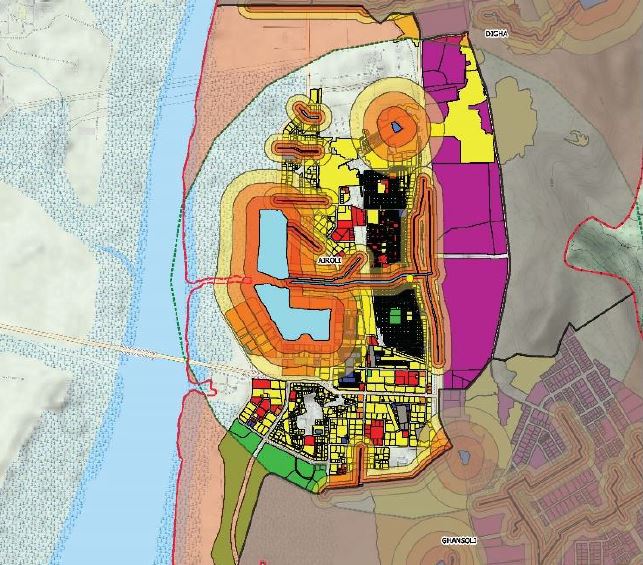
Flood Zones Map
Project status: Completed, Client: UNDP
RIKA India with the USAID-GoI-UNDP Partnership Project has worked on ‘Developing Resilient Cities through Risk Reduction in the context of Disaster and Climate Change”. The purpose of this assignment was to develop eight Ward level Disaster Management Plans on the lines of the Navi Mumbai Disaster Management Plan 2019 and incorporate the Hazard, Risk and Vulnerability Assessment of Navi Mumbai in the same. The project includes detailed review of global practices for the formulation of cities/ward level emergency Management.
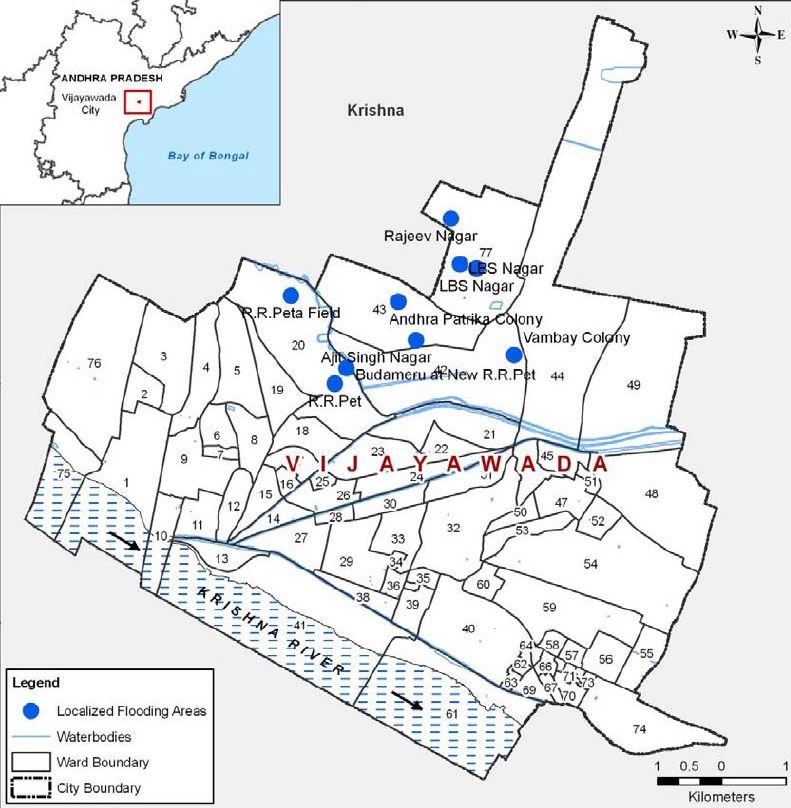
Flood prone areas, Vijayawada
Project status: Completed, Client: UNDP
The assignment was under the umbrella of the USAID-GoI-UNDP Partnership Project on
‘Developing Resilient Cities through Risk Reduction in the context of Disaster and Climate
Change’. The purpose of this assignment was to develop 18 Ward Level Disaster Management Plans incorporating all the applicable provisions laid down in the City Disaster Management Plan and Hazard Risk and Vulnerability Assessments of Vijayawada. It aims to review the global practices for the formulation of cities/ward level emergency management.
Additionally, it also proposed to organize a table-top simulation to train the stakeholders on
the efficacy of the plan and the SOPs during a disaster. Being highly prone to landslides and
Krishna River floods, 10 hill area wards and 08 Krishna floods wards of Vijayawada city were
selected to prepare their Ward level Disaster Management Plans.
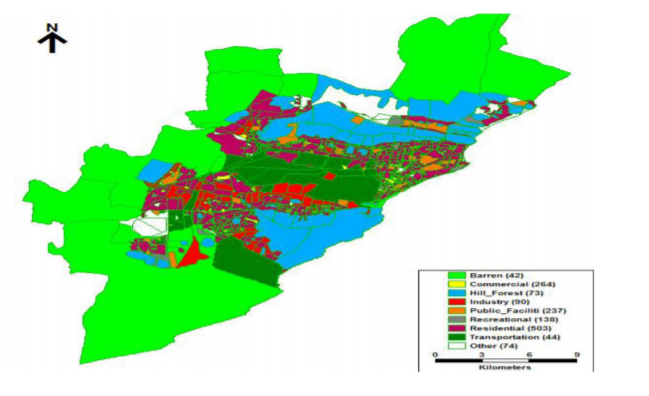
Landuse of Visakhapatnam
Project status: Completed, Client: UNDP
The assignment was under the umbrella of the USAID-GoI-UNDP Partnership Project on ‘Developing Resilient Cities through Risk Reduction in the context of Disaster and Climate Change’. The purpose of this assignment was to develop 18 Ward Level Disaster Management Plans incorporating all the applicable provisions laid down in the City Disaster Management Plan and Hazard Risk and Vulnerability Assessments of Visakhapatnam. It also aimed to review the global practices for the formulation of cities/ward level emergency management concerning the hazards prevalent in Visakhapatnam city. Additionally, it also proposed to organize a table-top simulation to train the stakeholders on the efficacy of the plan and the SOPs during a disaster. Total 18 wards of the city were selected looking at wards’ proximity to the coast, associated hazards, and its industrial profile.
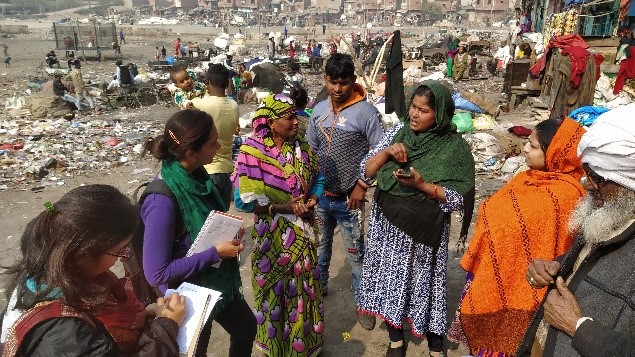
Community dialogue
Project status: Completed, Client: Caritas India
The overall purpose of this study was to assess the situation of target group (with focus on women, children and youth) under two major components – communities taking risk informed decisions to mitigate the impact of identified risks and community dialogues were conducted with different concerned stakeholders for their rights and entitlements (with respect to DRR). The programme was implemented in six slums of Delhi (Shastri Park, Naib Sarai, Mansarovar park, Geeta Colony, Jahangir Puri (K & D Block) and Bhalsawa (East and North-East Districts) and three slums of Chennai (Sadaipet slum, Nesapakkam and T. Nagar) with a cluster programme approach, for building resilience of urban community’s through community networks and civil society networks all the while involving other concerned government/non-governmental stakeholders. RIKA India prepared a comprehensive report with key findings, conclusions and recommendations based on field visits and literature review.
Projects 2019-2020

GIFT City
Project status: Completed, Client: Gujarat Institute of Disaster Management and Gujarat Infrastructural and Financial Tech City
GIFT City is being developed as the high-density urban area with state-of-the-art infrastructure services in Gandhinagar district of Gujarat. Disaster Risk Management Plan (DRMP) for GIFT was unlike that of any conventional city since it is a green field development. RIKA India developed the DRM Plan of GIFT City in participatory approach with multiple stakeholders and presented in an implementable manner. This project was undertaken with Gujarat Institute of Disaster Management (GIDM) which is one of a kind, state level training institute in Disaster Management in India. The project included capacity building and training exercises for the stakeholders to enable continuity and updation of the plan.
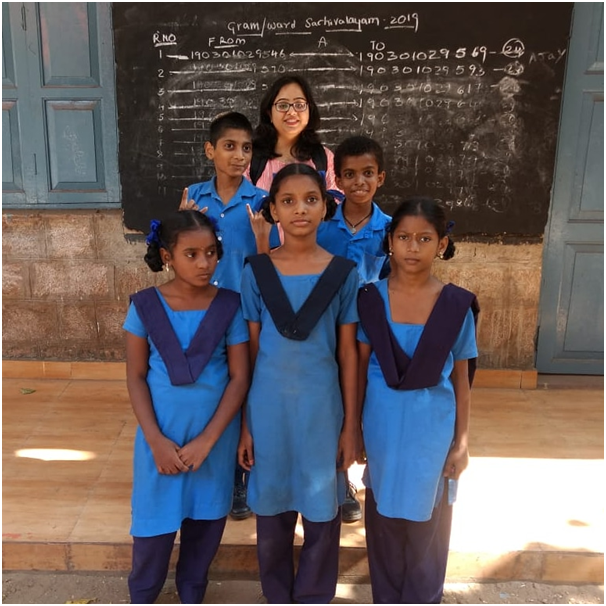
SDMP, Vishakhapatnam
Project status: Completed, Client: UNDP
The aim of the project was to inculcate the culture of Comprehensive School Safety in the identified five schools of Vishakhapatnam City. Among the various groups affected by the past disasters, children are the most adversely impacted group as they are extremely vulnerable to social, physical and psychological factors due to the lack of knowledge and understanding of disasters. Therefore, inculcating the culture of risk reduction and resilience is a prerequisite to reduce the vulnerability of school children. In this regard, RIKA India developed comprehensive School Disaster Management Plans and Information Education Communication (IEC) content which is exclusive to the identified schools.
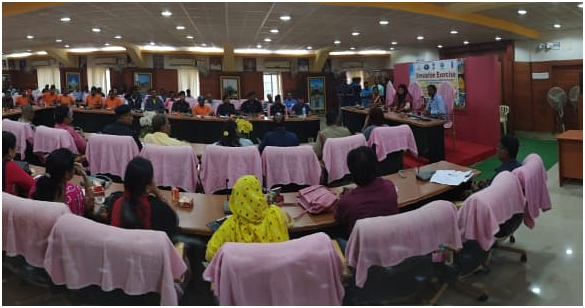
Simulation exercise training, Cuttack
Project status: Completed, Client: UNDP
Simulation exercise at a city level is an over-arching approach which not only aims at testing and evaluating the laid down plans and SOP but also targets inculcating the culture of awareness and preparedness, supporting cooperation among all stakeholders and assessing the functioning of existing resources. RIKA India prepared hazard specific SOPs for the major hazards such as cyclone, floods, and fire for the stakeholder departments of Cuttack city. Thereafter, we conducted a preparatory planning meeting, training, simulation exercise, and debriefing for a triggered disaster involving stakeholder departments. The challenges were identified and a comprehensive report and video documentation of the exercise was developed.
Projects 2024-2025
- Technical Support for Demonstrating a Scalable model for Climate Resilient Solid Liquid Waste Management System
- Vulnerability and Capacity Assessment for Flood Risks
- Development of Flood Risk Assessment Framework and a Roadmap for Making Cities Resilient
- Framework to help decide when and what kind of NbS solution to implement
Project status: Ongoing, Client: UNICEF India
RIKA India is supporting UNICEF in providing technical inputs to the Panchayati Raj Department and District Administration in collaboration with IIT Kanpur to demonstrate a scalable and climate-resilient Operation and Maintenance (O&M) model for Solid and Liquid Waste Management (SLWM) in three villages of Kanpur District. RIKA will conduct baseline and endline evaluations for climate resilience of existing SLWM systems and implement suitable intervention in two villages of Kanpur and evaluate the effectiveness of the intervention in achieving the desired outcomes. The project seeks to establish a replicable model for sustainable SLWM practices, enhancing climate resilience and operational efficiency at the village level.
Project status: Ongoing, Client: Chhatrapati Sambhajinagar Municipal Corporation (CSMC)
RIKA India is conducting a vulnerability and capacity assessment of Zones 4, 7, and 8 of Chhatrapati Sambhajinagar Municipal Corporation (CSMC) in Maharashtra to address flood risks. The project aims to identify flood-related vulnerabilities, evaluate the capacity of key stakeholders, including relevant line departments and exposed communities, and provide actionable recommendations for flood risk mitigation and management. The project will propose measures to enhance stakeholder capacity through targeted interventions. The outcomes will enable the Municipal Corporation, its line departments, and the Disaster Management Office to implement risk-informed mitigation strategies, develop effective Standard Operating Procedures (SOPs), and strengthen the city’s overall resilience
Project status: Ongoing, Client: National Institute of Disaster Management (NIDM)
RIKA India is supporting NIDM by undertaking the assignment to support the Indian cities in addressing the need for a holistic and multi-dimensional systems approach to understanding and managing of evolving flood risks being faced by them. The two study areas for this assignment are the cities of Guwahati in Assam and Manikonda in Telangana. The assignment has specific focus on floods, particularly urban floods in both the study areas. The following are the key tasks a) formulate a flood risk assessment framework for the study areas;
b) devise a roadmap for enhancing urban flood resilience; c) create a training module; and d) deliver training sessions for relevant stakeholders from the study areas. The project is being done by a consortium consisting of Resilience Innovation Knowledge Academy (RIKA) India Pvt. Ltd., Walter P Moore Engineering India Private Limited, and the Indian Institute of Technology (IIT) Guwahati led by RIKA India.
Project status: Ongoing, Client: World Resources Institute (WRI)
RIKA India has been selected under the India Forum for Nature-based Solutions (NbS) Research Program to support decision-making frameworks for NbS by conducting desk research of existing frameworks and selecting NbS for implementation and review these for strengths and challenges, mapping government schemes and policies and identify a broad list of NbS solutions for implementation across a variety of Indian urban geo-climatic conditions. The team would interview stakeholders to determine the current outlook towards NbS, decision-making criteria, institutional structures and available expertise, data-sets and feedback mechanisms.
Projects 2023-2024
Project status: Completed, Client: CBM India Trust
RIKA India is supporting CBM India Trust by undertaking a study to understand the situational analysis in the country, related to Climate Change and Environment, Disability Inclusive Disaster Risk Reduction, and Humanitarian Response. Under this critical needs, gaps, and opportunities to promote inclusion are being assessed. The current project aims at developing an in-depth understanding of the situation in terms of its general development context and its status on realising equality for persons with disabilities especially during disasters and humanitarian crisis.
Projects 2022-2023
- Development of SOP/Guidelines to establish SIDM in the State of Maharashtra
- Health Disaster Resilience Assessment for Bongaigaon District, Assam
Project status: Completed, Client: UNDP, India
Under an umbrella project of UNDP, “Strengthening the Disaster Risk Management systems for the Government of Maharashtra”, the current project aims at developing SOP/guidelines for establishing a dedicated State Institute for Disaster Management (SIDM) as a state-of-art excellent institute for training and capacity building, research, planning and knowledge management of varied aspects of disaster risk management in the State. The guidelines will be developed by studying the similar existing institutions in India and globally along with undertaking active stakeholder consultations and engagement in Maharashtra to understand the specific context and needs of the State.
Project status: Completed, Client: National Health Mission, Assam
The aim of the project was to analyze the current status of the healthcare system in Bongaigaon district by utilizing a comprehensive Healthcare Disaster Resilience Assessment Framework rating tool (5-point rating), and thereby generating key learning for improving disaster resilience. The mapping and assessment exercise of all health centres in Bongaigaon, Assam to generate short-term, medium, and long-term plans based on their disaster resilience was conducted with support from India Japan Laboratory (IJL), Keio University, Japan; Indian Institute of Technology (IIT) Guwahati in collaboration with the National Health Mission (NHM), Assam. The survey and the analysis of the total 137 centres in the district was undertaken as per the available four health blocks, namely Boitamari, Bongaigaon, Manikpur, and Srijangram through field-based research, key informant interviews, and insights.
Projects 2021-2022
- Assessing the profitability of climate smart agriculture in the Ganges-Brahmaputra River basin
- Systemic and Cascading Risks: Challenges and potentials in Asia-Pacific’s risk landscape
- ASEAN Mapping Exercise to promote synergy with ASEAN Sectoral Bodies, entities associated with ASEAN
- Country Paper on Building resilience for Climate Change and Disasters
Project status: Completed, Client: Asia-Pacific Network (APN) for Global Change Research
This study aims to assess the profitability of Climate Smart Agriculture practices through cost and benefit analysis adopted by small-scale farmers in Ganges Brahmaputra River basin of South Asia particularly in Bangladesh, India and Nepal. Under the Collaborative Regional Research Programme (CRRP) of Asia-Pacific Network (APN) for Global Change Research this project intends to provide empirical economic evidence that can inform the development of new climate-smart policies. Thereby advancing knowledge on the costs and benefits of Climate Smart Agriculture practices.
Project status: Completed, Client: UNDRR, Bangkok
The project was a scoping study for Systemic and Cascading Risk in the Asia-Pacific Region. The board aim was to understand the different aspects and dimensions of systemic and cascading risks by mapping and analyzing the good practices, lessons learned and identify present gaps in the management of systemic and cascading risks. The findings were a value addition toward the development of a framework to address systemic risks. The report is accessible here.
Project status: Completed, Supported by: SEADPRI-UKM
RIKA India in collaboration with the Southeast Asia Disaster Prevention Research Initiative, University of Kebangsaan Malaysia (SEADPRI-UKM) Global Resilience Innovation Laboratory (GRIL) of Keio University, Japan is undertaking the project on enhancing the role of the Joint Task Force on Humanitarian Assistance and Disaster Relief Mechanism to promote a whole-of-ASEAN approach towards supporting disaster management. The project aims to identify the current and potential roles of each relevant sector bodies, centres and, entities in disaster management alongside mapping the technical expertise, capabilities and resources from each relevant sector which could be made available at ASEAN’s disposal for Humanitarian Assistance and Disaster Relief (HADR) activities.
Project status: Completed, Client: UNORC
The overall aim is to develop a country paper on building resilience for climate change and disasters, with a focus on India. The paper discusses the nexus between climate change and disaster risks and the current and potential challenges it pose to India towards achieving the sustainable development agenda. It identifies key drivers, challenges, opportunities in the context of India and suggests way forward especially for achieving a “better recovery post COVID. Overall, it aims to inform the India Common Country Analysis for the next UN Sustainable Development Framework (2023-2030).
Projects 2020-2021
- Strengthening Disaster Risk Governance Framework in India: Learnings from global best practices
- DRR and Climate Change, Odisha
- Preparation of Guidelines for Establishment of Emergency Operations Centre (EOC)
- Functional Review, OSDMA
Project status: Completed, Client: NDMA
The project is undertaken as part of the National Cyclone Risk Mitigation Project (NCRMP) of the National Disaster Management Authority in India. The project is intended to study and understand the existing Disaster Risk Management (DRM) governance structures and corresponding good practices in the eight selected countries of Australia, Canada, Germany, Indonesia, Japan, Philippines, Turkey, and the United States of America. Focusing on the key aspects of DRM Governance Structures (including organization structures, functions, and
important features), Stakeholder Engagement (including private sector, educational institutions, and voluntary sector) and approach to Disaster Risk Reduction (like for resilience building), a precise understanding of DRM approach in each of the eight case study countries is established. This project is done in partnership with IJL, Keio University, Japan and ISET-USA.
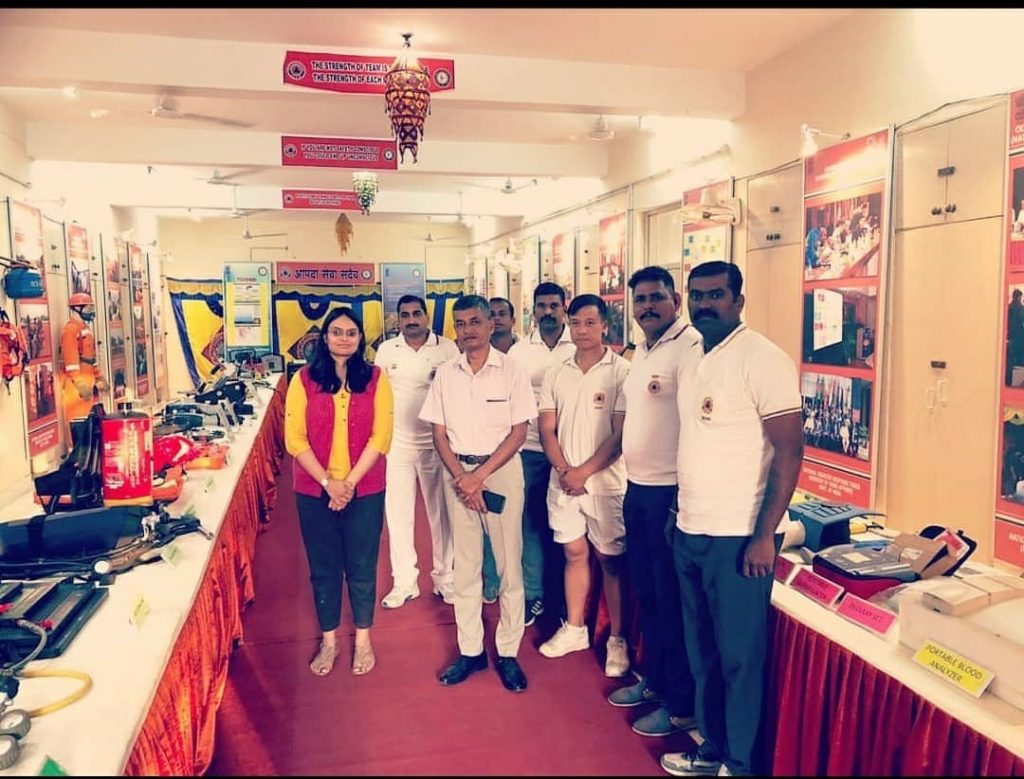
Consultancy for DRR & CC, Odisha
Project status: Completed, Client: UNRCO
RIKA India has provided technical assistance to the State Government of Odisha in setting up the International Centre for Disaster Management. It included developing a paper capturing details of various centers for excellence (DM and CC) set up in different parts of the world. RIKA India provided the technical support to the UNRCO and the State Government of Odisha in establishing agreement with various International Centers and Universities in the area of Disaster Management and Climate Change.
Project status: Completed, Client: UNDP
This assignment aimed at the preparation of Guidelines for Establishment of Emergency Operation Centre (EOC) has been undertaken under the umbrella project ‘Developing Resilient Cities through Risk Reduction in the context of Disaster and Climate Change’ of USAID-GoI-UNDP. It has the following components:
1. Component 1: Review of existing national and international best practices of Emergency Operations Centres (EOCs)
2. Component 2: Developing guidelines for the establishment of Emergency Operations Centre (EOC) by Urban Local Bodies
The guidelines developed are informed by global best practices and are contextualized to the needs of Indian cities for effective implementation and replication.
Project status: Completed, Client: World Bank
The World Bank is in the process of preparing a DPF (Development Policy Finance) for the state of Odisha with the aim to strengthen institutions and systems for Social Protection, Statistics and Resilience. A functional review of OSDMA has been envisioned towards strengthening performance, addressing evolving risks, and establishing institutional mechanisms for knowledge-exchange. RIKA India prepared a ‘Review Report’ and a ‘Note on Institutional Restructuring of OSDMA’. It included a review of OSDMA’s organizational readiness to address the current and evolving disaster and climate risk context of Odisha and provided recommendations towards the same. A broad assessment of OSDMA’s strategic priorities, programs and thematic initiatives and their alignment with the Authority’s legally envisioned role as well as the needs of the sector was undertaken. It also included an in-depth analysis of OSDMA’s current and potential role in knowledge management (including agenda-setting, institutional mechanisms, skills and capacities) in the context of GoO’s articulated need for an ‘International Center on Disaster Mitigation and Recovery’
Projects 2019-2020
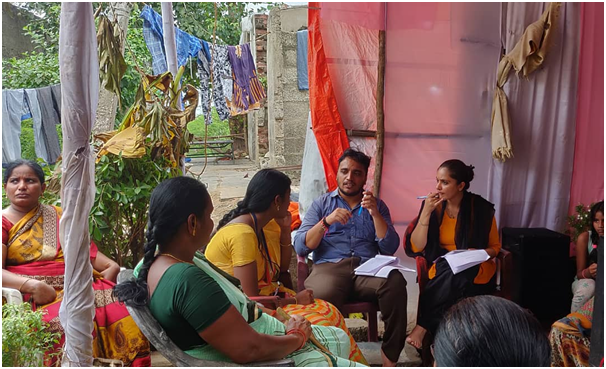
Focus group discussion
Project status: Completed, Client: UNDP
The assignment aimed to review and update the 2012 Early Warning System (EWS) in Vijayawada City. The assignment included the review of the technical design, structure and efficiency of exiting EWS in the city. As EWS involves multiple stakeholders and a set flow of communication, the assignment also seeks review of linkages between stakeholders for collection and dissemination system along with technologies involved and up-time performance. In the end, it also seeks to identify areas through which the EWS of the city could be strengthened and linked with district and departmental disaster management plans. The actual EWS mechanism was understood and reviewed through one to one consultation with the identified stakeholders under the assignment. Various interviews/FGDs were conducted with officials of the stakeholder departments and community representatives and case studies would be developed. After analysis of the field level data and observations, the guidelines and recommendations were suggested for enhancing the EWS for the city.
Project status: Completed, Client: United Nations Office for Disaster Risk Reduction Middle East
The Regional Assessment Report is an important initiative of the UNDRR- Regional Office for Arab States (ROAS) that contributes to the achievement of the Sendai Framework through monitoring risk patterns and trends and progress in disaster risk reduction in the Arab region while discussing various challenges and opportunities for development of Arab countries in DRR. RIKA India developed the chapter for the report giving an overview on disaster risks in the region based on evidence-based analysis. The chapter presents an analysis of progress achieved at regional, sub-regional, national and local levels. It also analyzes the relation between progress in achieving both the Sendai Framework for Disaster Risk Reduction (SFDRR) and the Sustainable Development Goals (SDGs), exposing the effects of SFDRR on overall SDG achievements and effect of SDG achievement on DRR. The chapter also dwells into some of the specific thematic areas of SFDRR and provide deeper understanding of issues and challenges in those areas. It also presents case studies on the evidence of the shift from Managing Disasters to Managing risk at the national level in the Arab states.
Project status: Completed, Client: United Nation Office of Disaster Risk Reduction
The project involves studying the NATECH risk in the Asia Pacific region based on cases studies. The analysis of the case studies would lead to devising guiding principles for managing NATECH risk and development of a framework for NATECH risk management. The project included detailed case studies analysis, development of a regional NATECH framework and guiding principles along with a Study Report on NATECH risk management for Asia pacific. Project report here.
Project status: Completed, Client: World Bank
RIKA in partnership with ADPC undertook a World Bank funded project of the regional assessment of DRM institutions, so as to bring forth the challenges and issues which need immediate attention so as to truly mainstream DRM as a culture. The project spans across seven SAARC countries namely, Pakistan, Bhutan, Sri Lanka, Afghanistan, India, Bangladesh and Nepal. The project entailed regional stock-taking of national, sub-national and local DRM institutions.
Projects 2024-2025
Project status: Ongoing, Client: UNESCO
The project aims to create a dynamic market for innovative solutions to build resilience and adapt to disaster and climate risks by establishing a comprehensive Digital Innovation Hub. This hub will facilitate private sector engagement and investment in Disaster Risk Reduction (DRR) and Climate Change Adaptation (CCA) through four key components:
Open Data Platform: Provides accessible data on natural hazards and socio-economic factors.
Digital Library of Solutions: Showcases successful initiatives and technologies.
Co-Working Digital Platform: Enables collaboration among stakeholders to foster innovation.
Digital Marketplace: Matches stakeholders (governments, donors, private sectors, and academics) with potential solutions, promoting collaboration and investment.
The hub aims to guide stakeholders, particularly from the private sector, to understand emerging risk landscapes, appreciate existing solutions, and collaborate to develop innovative approaches. It will address gaps in field priorities and data on risk drivers by developing a strategy or white paper outlining trends and opportunities for innovation in DRR and CCA. Additionally, the digital marketplace will highlight pilot projects from private players, demonstrating their effectiveness, scalability, and economic viability, encouraging further action from other private entities.
Projects 2021-2022
Project status: Completed, Client: ADPC, Bangkok
The project aims to provide technical support to 10 selected innovators under the Tech-Emerge Resilience India Challenge in terms of engaging, monitoring, and evaluating technical aspects of the solutions being implemented through disruptive technologies during different phases of planning and implementation. The outcome of the project focuses on the creation of states and cities resilient to climate change and disaster risks through the adoption of practices and solutions which are environmentally safe and sustainable through the use of disruptive technology. It would primarily help in addressing key sectors such as social innovation, development policy, finance, and technology by providing a platform for action-driven discussions and deliberations with other innovators as well as end-users and technology experts from the field.
Projects 2020-2021
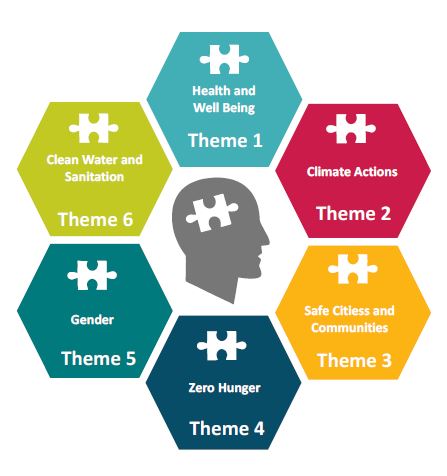
Hackathon themes
Project status: Completed
To unite innovators, mission-driven entrepreneurs, experts, and developers in finding unique solutions for tackling the issues of pandemic and future disasters to make the society resilient and sustainable this online hackathon was created. To ensure the wider outreach and feasibility of innovative ideas/solutions, thematic mentors guide the specific groups (through weekly sessions). Emphasis of the event is to develop implementable solutions and prototype development. The SIOH 2020 Report can be accessed here.
Project status: Completed
RIKA India along with Visvesvaraya National Institute of Technology, Nagpur, India co-hosted the Urban Thinker Campus from 9th to 11th December, 2020. The Urban Thinkers Campus is an initiative of UN Habitat’s- World Urban Campaign which aims to bring dialogues amongst experts from various fields of science and technology, management etc. for better urban management. The event focused on comprehending the present and future urban challenges especially in the Asian countries and explores workable solutions that would ensure attaining sustainable goals in the context of urban climate change. Our other co-organizers included Centre of Excellence in Disaster Mitigation and Management, Indian Institute of Technology (IIT) Roorkee, India, India Japan Laboratory, Keio University, Japan, Resilient Urban Planning and development (RUPD) GbR, Bonn, Germany, ARISE India FICCI, IRDR IcoE and IRDR RCS. Hon. Minister Nitin Gadkari was the Chief Guest with special address by Ms. Mami Mizutori, SRSG and Head UNDRR. Some of the eminent speakers included Dr. Mazlan Othman, Director Regional Office for Asia and the Pacific, International Science Council, Malaysia, Dr. Emily Ying-Yang Chang, Director Collaborating Centre for Oxford University etc. The Urban Thinkers Campus 5.0 report can be accessed here.
Projects 2019-2020
Project status: Ongoing
Establishing an incubator at the university level to mentor and encourage future entrepreneurs, who can translate these targets into meaningful actions on ground, is an important factor to actively create opportunities for private sector in disaster risk reduction. The themes vary from disaster risk reduction, safety, sustainable development, women entrepreneurship, conflict and peace, heritage risk management, citizen science etc.

Signing of MoU, VNIT Nagpur
- RIKA India has successfully established a Disaster Risk Reduction and Climate Change thematic Incubation Centre at Mody University, Sikar, Rajasthan. This centre focuses on women leadership in Disaster Risk Reduction
- Another Incubation Centre with a focus on Science and Technology based solutions for smart city of Nagpur on themes of environment, climate change and DRR is opened at Visveswaraya National Institute of Technology (VNIT), Nagpur, Maharashtra.
- RIKA India has also partnered with BRAC University, Dhaka, Bangladesh for Thematic Incubation Centre on coastal risk management and Disaster Risk Reduction.
Projects 2018-2019
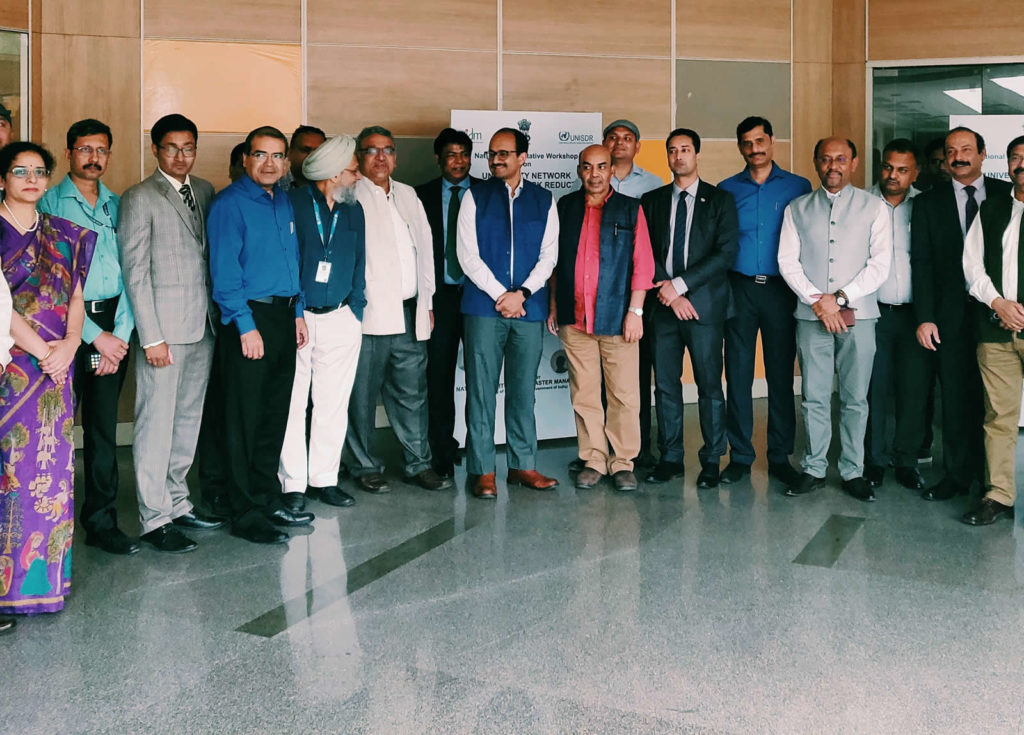
Participants at India University Network Workshop
Project status: Completed, Client: UNDRR, Bangkok office
RIKA supported the initiative on establishment of a professional network of universities and institutes which offer a course on Disaster Risk Management. This professional association will promote common efforts towards sharing of disaster knowledge across the region in educational institutes. This project entailed detailed study, mapping of university courses and strategy-building for the professional development of the nation-wide association. This initiative was supported by UNISDR and NIDM.
Projects 2020-2021
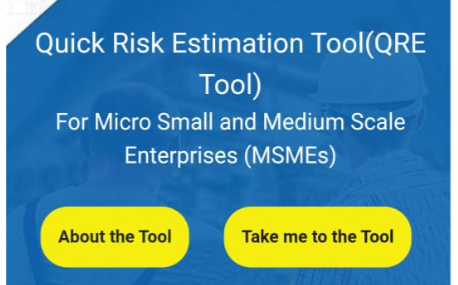
Risk Estimation Tool
Project status: Ongoing, Client: UNDRR
In order to support MSMEs in aligning their thinking towards risk proofing their businesses, the quick self-risk estimation tool was created to support business owners in identifying possible internal and external risks to their business from COVID-19, likelihood (possible indirect and wider impacts) of COVID-19 to business and strengthen risk awareness and communication between business owners. Link for tool.
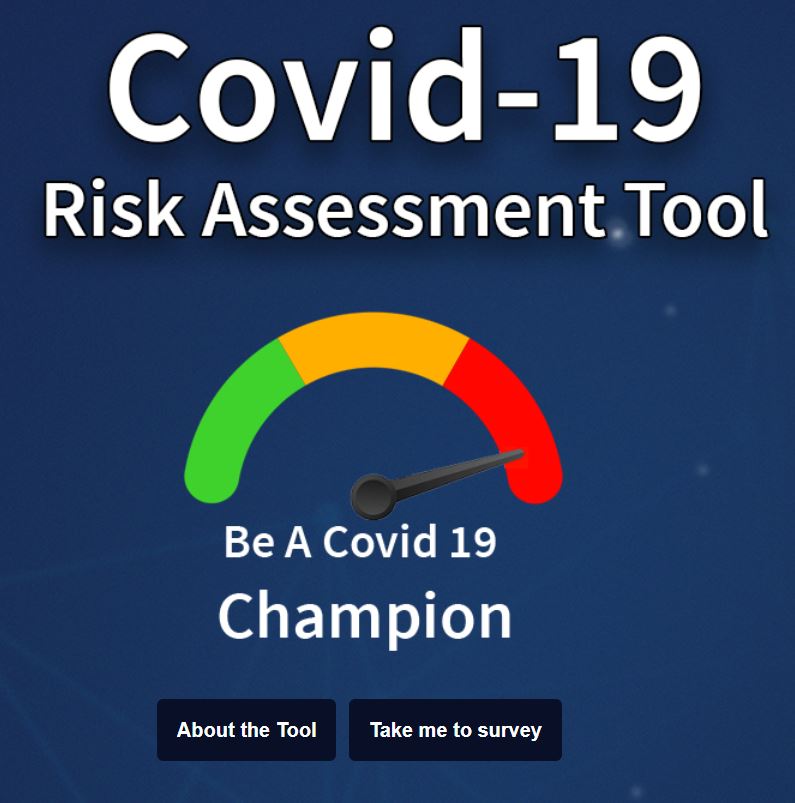
Risk Assessment Tool
Project status: Completed, Designed in collaboration with India Japan Laboratory, Kieo University
In order to assess risks, this tool has been designed to interlink four major factors health, social policy, behavior, and exposure that contribute to spread of COVID-19. The application is designed to plot risk maps using crowd-sourced data. Link for tool.
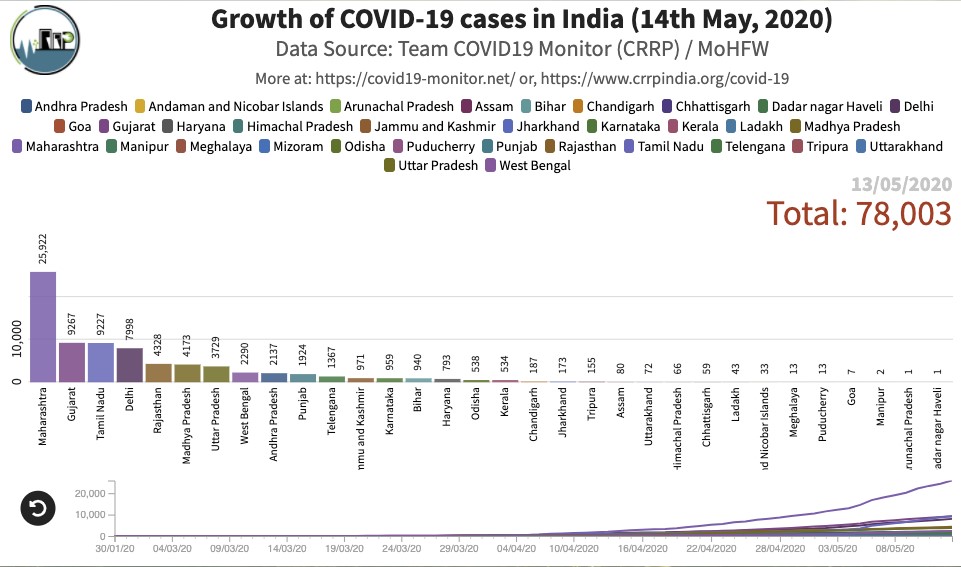
Covid-19 Monitor Data Visualization
Project status: Completed, Designed in collaboration with YIL and CRRP India
To track COVID-19 cases in India, Indonesia, Malaysia and Japan a database has been created to incorporate in the online portal. It was designed and launched by joint efforts of RIKA, YIL and CRRP India, In order to collect data, volunteer support was used and the case reports were cross-checked with multiple sources and verified against the data issued by Ministry. The COVID-19 Monitor was used to track and trace cases since the start of pandemic.
